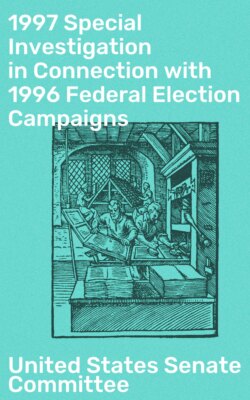Читать книгу 1997 Special Investigation in Connection with 1996 Federal Election Campaigns - United States Senate Committee - Страница 28
На сайте Литреса книга снята с продажи.
The Abuse of Soft Money
ОглавлениеTable of Contents
As part of its inquiry, the Committee had intended to investigate the role of nonprofit groups in the 1995–96 federal election cycle, particularly whether such nonprofit organizations were genuinely nonpartisan and acted independently of political parties or candidates, as required by federal law. In addition, the Committee planned to investigate whether political action committees evaded statutory limits on political contributions, and whether nonprofit organizations coordinated so-called “issue advocacy” advertising with political candidates to be considered inkind campaign contributions limited and regulated under federal election law.
To this end, the Committee subpoenaed 32 nonprofit organizations, not including the principal party committees and presidential campaigns. Although a number of these organizations did begin prompt compliance with the Committee’s subpoenas, most of them, led by the AFL-CIO, refused to produce any documents or witnesses. Indeed, some groups simply cited the AFL-CIO’s non-compliance as justification for their own non-compliance. Though the AFL-CIO ostensibly based its refusal upon various legal and “constitutional” grounds, its clear purpose was to obstruct and impede the Committee’s investigation—as indeed the imposition of the December 31, 1997 deadline virtually invited it to do by preventing the Committee from relying upon judicial contempt procedures, the usual means to assure compliance with subpoenas.
In light of the poor cooperation received from most of these organizations, the Committee believes that it is generally inappropriate to draw conclusions about the role of non-profit groups in the 1995–96 election cycle. For the most part, the information available was insufficient to permit meaningful analysis: few documents were produced, witnesses were unavailable to explain the meaning and context of what documents did arrive, and key individuals with knowledge of the matters in question refused to testify before the Committee.
Despite these obstacles, however, the Committee received information that the AFL-CIO coordinated its political activities with both the DNC and the Clinton/Gore campaign. Testimony from White House and DNC officials made clear that White House aides and the AFL-CIO carefully reviewed each other’s advertisements and coordinated their timing and placement.
With regard to conservative organizations, the Committee’s investigation uncovered no evidence that Triad Management Services engaged in such coordination with the Republican Party, although Triad may have coordinated with individual candidates. The Committee also determined that while the Republican National Committee (“RNC”) donated funds to certain non-profit groups, this was in no way illegal or improper: no evidence existed that the recipients spent this money to influence federal elections at the RNC’s request or direction.
Finally, the Committee held extensive hearings on the National Policy Forum (“NPF”), a think-tank established by the RNC. The Committee was particularly concerned by allegations that the RNC knew that a loan it made to the NPF—and upon which the NPF later defaulted amid much acrimony—had been guaranteed by foreign money through Hong Kong businessman Ambrose Young. Additionally, the Committee attempted to determine whether the loan guarantee proceeds were improperly funneled into federal election campaigns in 1994. Ultimately, however, the Committee determined that it is neither illegal nor improper for nonprofit organizations to receive money from foreign sources, provided that no such funds enter federal campaigns. No foreign money involved in NPF’s loan guarantee was so used: none of these funds were diverted to Republican “hard money” accounts, and their expenditure was not coordinated with political candidates; rather, the NPF used the money to repay a valid, pre-existing debt.11
